University Core (English) *
(Applicable to students who admitted to Year 1 of the undergraduate programme in or after the 2018-19 academic year)
This course aims to enhance students’ English language skills in critical reading and listening as well as academic writing.
This course strengthens students’ ability to: (1) read academic discourse by engaging in the analysis of the rhetorical and linguistic features used in academic writing; (2) respond critically to ideas through examining and evaluating evidence and arguments; (3) write coherent and structured academic essays by developing core transferable skills in critical thinking, reading, and writing; (4) understand extended academic discourse by employing cognitive and metacognitive lecture comprehension strategies; and (5) use reflection and self-assessment to become a more independent and competent reader, listener and writer.
Prerequisite: GCLA1008 University English I
This course, as a continuation of University English I, aims to further students’ English proficiency in reading and writing to an advanced level, and reinforce the effective use of communicative strategies in English for academic purposes.
This course aims to help students: (1) develop their critical/ evaluative reading skills for extensive academic texts; (2) develop skills in writing academic texts including a literature review, and extended essays/argumentative research papers; (3) develop research skills and conventions of citations and referencing in academic writing; and (4) enhance their oral presentation skills in an academic setting.
* To register for the University Core, please go to AR (Academic Registry) – BUniPort (University Cyber Port System)
#Note: 1. Please refer to the lists on the BUniPort for the courses offered during the Semester. 2. Classes may be cancelled due to insufficient enrollment
English General Education Courses *
The most epoch-making development in the field of language in the last 50 years was the rapid rise of English as a de facto ‘world language’, spoken all over the world by more non-native than native speakers. China (including Hong Kong) alone can now boast more speakers of English than the U.S. itself. The world in the 21st century will need to come to terms with these new realities—where English belongs to the entire world rather than to just a few countries, and where many ‘new varieties’ of English are emerging alongside the old varieties.
The course aims to help students acquire a timely new perspective on the English language as it evolves and adapts itself to communities all over the world where it is widely spoken (such as Singapore, Hong Kong and mainland China), in what Edgar Schneider calls ‘a sequence of identity rewritings and associated linguistic changes’. The dynamic expansion and evolution of English raises linguistic as well as social, political, cultural and educational issues which a world citizen will need to grapple with today, issues which bridge linguistic and cultural studies, identity theories, language pedagogy, as well as communication and media studies. One practical benefit of the course is that students will develop into more sophisticated and versatile users of the English language, be better able to understand different varieties of English as spoken by people around the world and be more sensitive to the cultural backgrounds and assumptions of different speakers.
In this course, the central focus is on enhancing students’ understanding and application of data-informed public policymaking within the Hong Kong context. The objective is to equip students with the analytical tools and interdisciplinary approaches necessary to assess and influence policy decisions effectively. By integrating quantitative analysis with qualitative insights, the course aims to foster a comprehensive understanding of how data-driven strategies can be employed to address complex social issues, aligning with specific targets of the United Nations’ Sustainable Development Goals (SDGs).
Students will evaluate how much Hong Kong’s government uses data in policymaking, focusing on transparency, accountability, and effectiveness. Through practical projects and case studies, they will explore the impact of data-informed decisions in areas such as public transportation, health, and environmental management. A significant component of the course includes opportunities for students to request data from the Hong Kong government and engage directly with lawmakers (LegCo members) and district council members. This experiential learning approach enables students to gain firsthand insights and practical experience in the policymaking process.
Ultimately, the course prepares students to become active agents of change in society. They will gain the competencies needed to navigate and influence the complex landscape of global sustainability challenges, equipped with the tools to implement and advocate for policy changes that contribute to the SDGs. This holistic approach not only enhances their analytical and expressive capabilities but also instills a commitment to lifelong learning and civic engagement in a globalized world.
* To register for the general education course, please go to AR (Academic Registry) – BUniPort (University Cyber Port System)
#Note: 1. Please refer to the lists on the BUniPort for the courses offered during the Semester. 2. Classes may be cancelled due to insufficient enrollment
English Credit-bearing Courses *
Prerequisite: Grade B or below in UCLC1008 / GCLA1008 University English I
This English course aims to help students (1) to improve their spoken fluency and grammatical accuracy in English in an interactive way, including the use of video clips from films, TV programmes, video blogs, songs and other aural materials; (2) to improve their conversational strategies; and (3) to enhance their spoken English to express their views and opinions in informal conversations, formal discussions, impromptu speeches and oral presentations.
This course provides hands-on training in teaching English/Putonghua during a service-learning trip, integrating language instruction with cultural contexts. Students will develop practical teaching techniques, problem-solving skills, and reflective abilities while engaging with diverse communities. They will learn to design tailored lesson plans for different learners.
For more details, please visit: https://www.translearnspace.org/1045-service-learning
本課程透過海外服務學習實踐,訓練學生教授英文/普通話的實用技巧,並將語言教學與文化背景相結合。學生將提升解決問題能力、反思意識及跨文化理解,學習為不同學習者設計針對性教學方案,掌握初步教學能力。
了解更多請訪問:https://www.translearnspace.org/1045-service-learning
This course aims to enhance students’ general proficiency in English in all the four skills of listening, speaking, reading and writing through films and short stories. Students will get extensive opportunities to watch and read, analyse, discuss, evaluate, and write about films/short stories. These learning activities will improve students’ independent English language learning skills and strengthen their critical thinking and imaginative response. As films and stories reflect human life, by engaging students in in-depth discussions of various issues related to society and life, the course will help them gain a better understanding of the value and meaning of life and their relationship with other people; and this in turn will enhance their cross-cultural awareness. In this respect, this course fulfils several HKBU’s Graduate Attributes.
This advanced-level English course provides intensive training and practice involving understanding and analysing English speech in various authentic situations, focusing on contextual meaning and cultural awareness that aid comprehension. The course aims to: (1) improve students’ accuracy in comprehending verbal communication from media, various daily situations and educational resources; (2) expand their cultural awareness – of customs, ethics, history, humour, human relations and regional and cultural speech differences; and (3) develop higher awareness of context-bound meaning such as ambiguity, implied meaning, spoken nuances, connotations beyond literal meaning, etc.
This 3-unit course offered by the Language Centre develops students’ language skills in human-AI interactions, focusing on effective communication and collaboration in community settings. Through service-learning projects, students will design, develop, and deploy customized chatbot solutions to address specific linguistic and communicative challenges within partner communities. The course covers foundations of generative AI, community engagement strategies, and implementation of AI solutions, while cultivating critical thinking and problem-solving abilities. Students will gain hands-on experience in chatbot development, community needs assessment, and evaluation of AI-driven solutions, preparing them to leverage AI technologies for social impact in educational and community contexts. Please note that this course involves field trips to Mainland China. Students are required to contact the course instructor via the Language Centre (lc@hkbu.edu.hk) before registering for the course.
Meet the teacher: https://youtu.be/2HePnZGUBHQ
Prerequisite: UCLC1008 / GCLA1008 University English I and UCLC1009 / GCLA1009 University English II
This course welcomes undergraduate students from all majors and provides vital professional communication skills that are much in demand in the globalized 21st century workplace. Through a focus on workplace communication needs, the course enables students to communicate effectively in a variety of formal and informal settings, including through a multi-cultural telecollaboration project. In the project, students will collaborate online with international peers to co-create business project proposals. The lecture portion of the course provides a foundation for effective business communication, teamwork strategies, and telecommunication skills. The workshop portion provides hands-on opportunities for students to implement the skills and strategies learned in a multi-cultural telecommunication environment. By taking the course, students will improve their professional communication skills by using English as a Lingua Franca, gain experience in producing multimodal marketing materials, and develop skills and strategies for telecollaboration with international peers.
* To register for the credit-bearing courses, please go to AR (Academic Registry) – BUniPort (University Cyber Port System)
#Note: 1. Please refer to the lists on the BUniPort for the courses offered during the Semester. 2. Classes may be cancelled due to insufficient enrollment
English Supplementary Courses / Workshops / Services (Non Credit-bearing) **
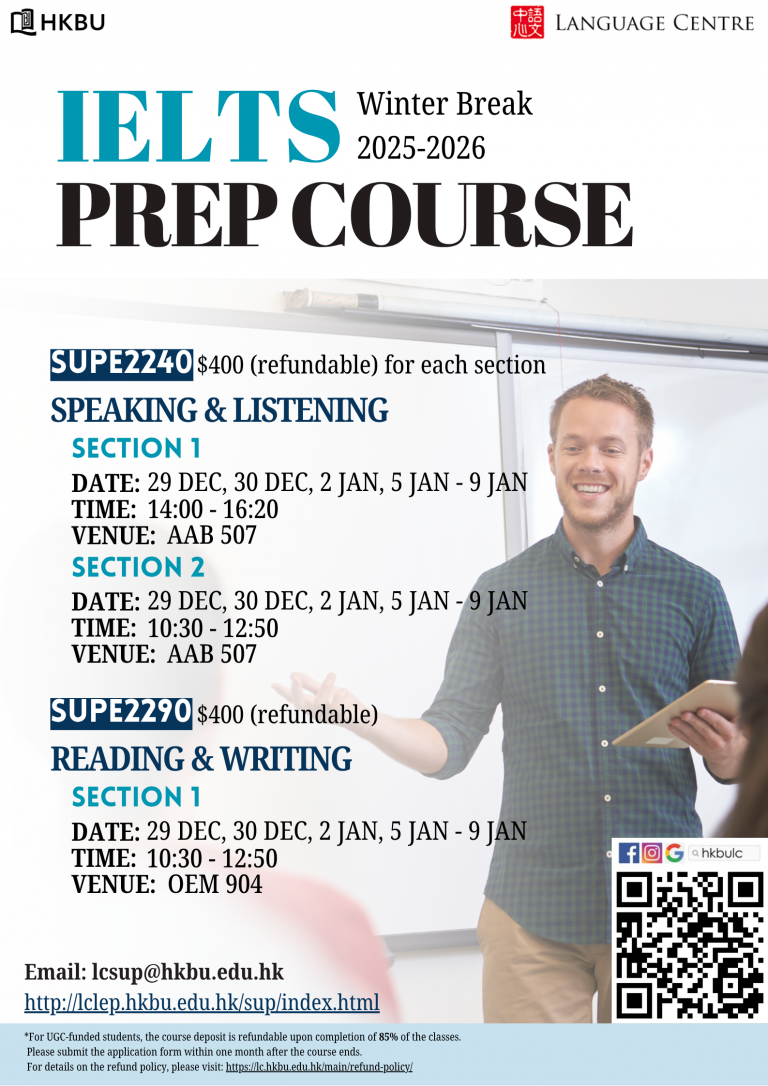
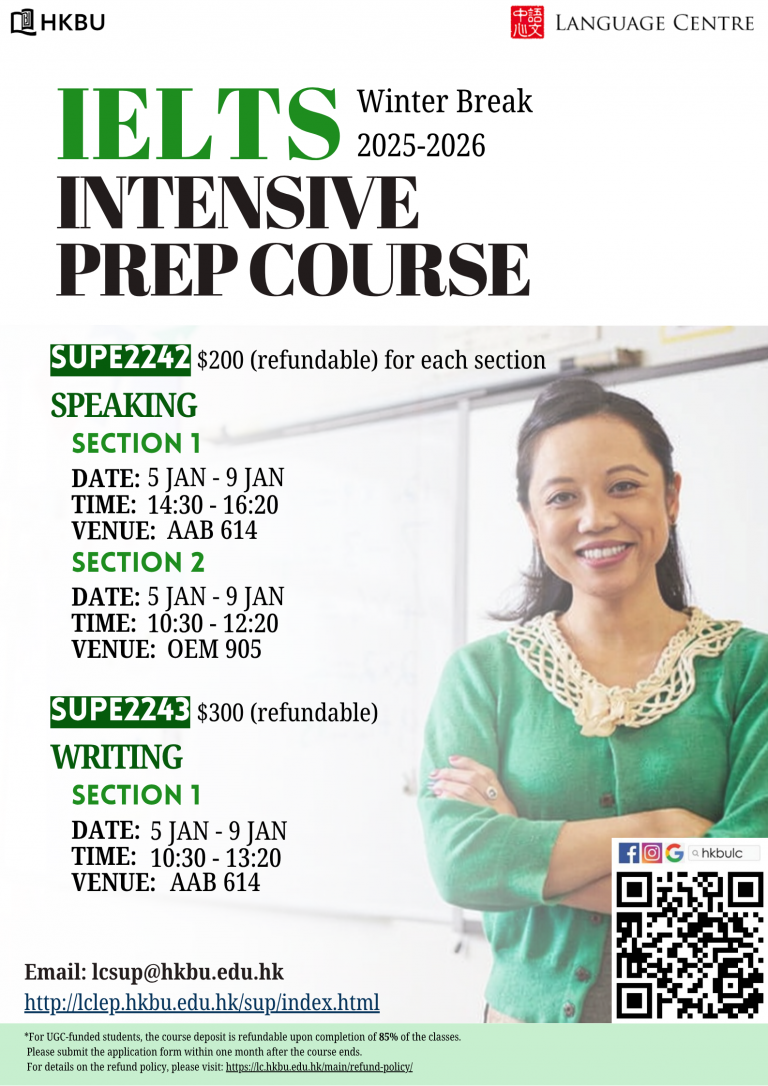
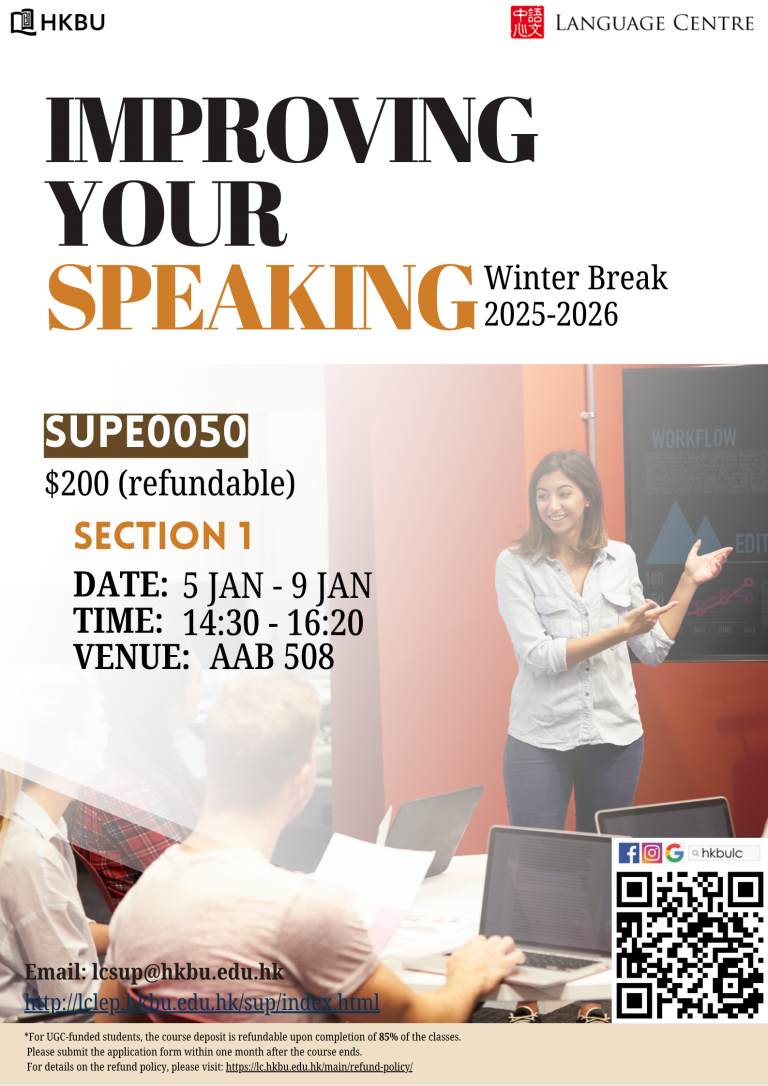
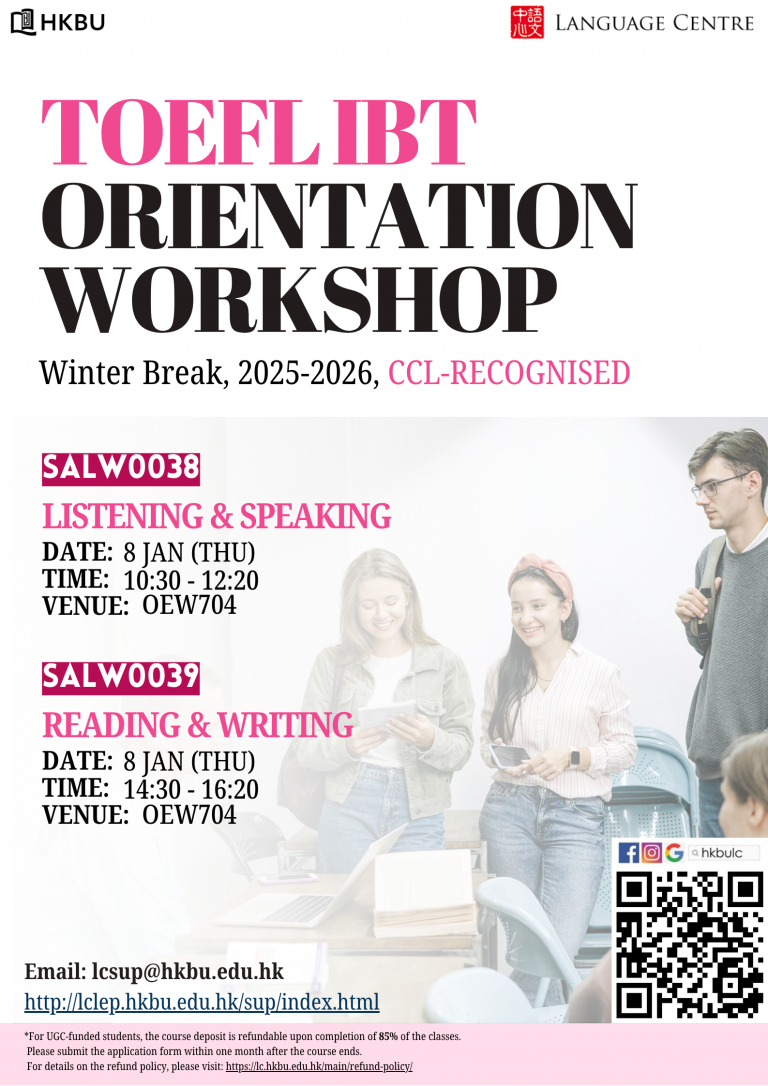
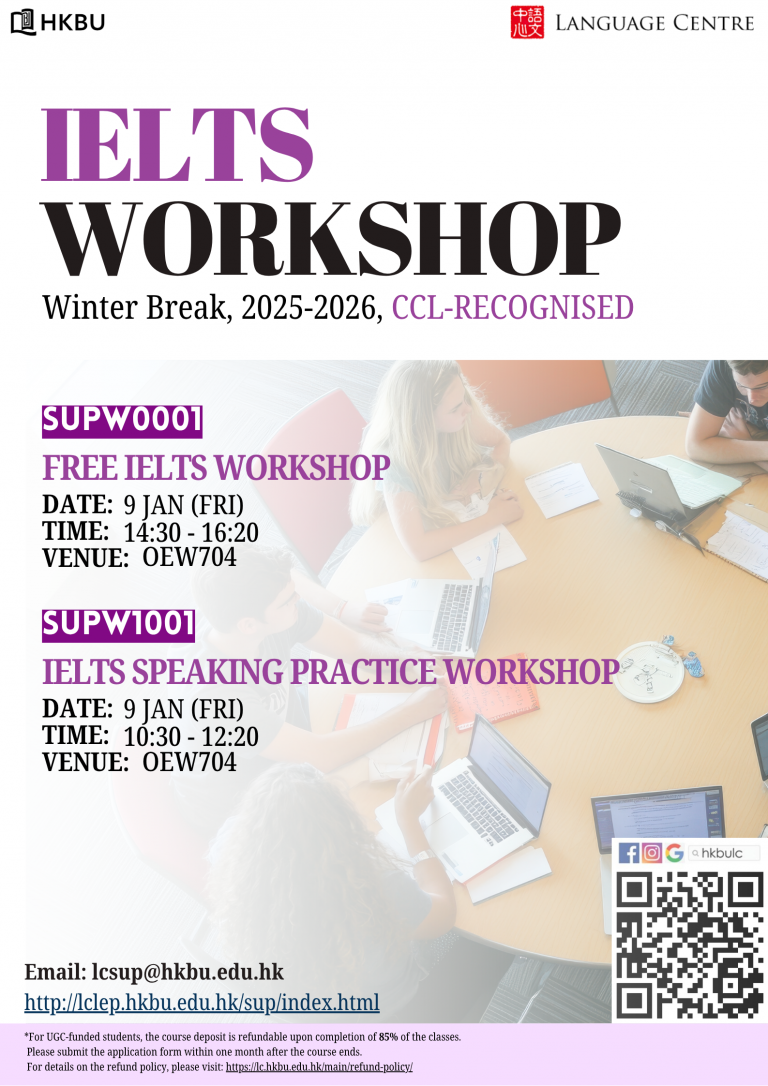
Speaking and Pronunciation
The course aims to cover the sound system of English as well as intonation, stress and rhythm. The difficulties experienced by Chinese speakers of English are addressed and students are encouraged to participate in pair and group work.
By the end of the course, students should be able to:
- Identify and produce English vowel and consonant sounds accurately;
- Discover the pronunciation of words in a dictionary using the International Phonetic Alphabet (IPA);
- Use word and sentence stress appropriately;
- Use English intonation confidently.
This 6-hour course aims to increase students’ confidence in speaking English through understanding the fundamentals of English Pronunciation. Class activities and lab practices will help students improve their articulation of English sounds and overcome pronunciation problems. Areas to be covered include International Phonetic Alphabet (vowels, consonant sounds) and pronunciation techniques (how to properly use the jaw, mouth and tongue).
This 6-hour course aims to increase students’ confidence in English pronunciation by focusing on intonation and stress. Class activities and lab practices will help students understand the key features of English pronunciation (such as rhythm, stress and intonation) and improve the speech-level aspects of their pronunciation. Areas to be covered include word stress, sentence stress, connected speech, and intonation.
Hong Kong Baptist University holds an English Speaking Contest annually in Semester 2 to offer all students a chance to use their English communication skills in a fun, lively setting.
In these two 2-hour workshops, the tutor will offer advice and discuss some important information and rules about the contest. Various examples of the type of speech expected will be shown and a Q and A session offered.
By the end of the workshop, students should be able to:
- Understand exactly the style of presentation they will need for the contest;
- Have a general idea of the speech they will present/do, if deciding to take part in the contest.
Writing
Enhancing English through Global Citizenship (EEGC) is an English enhancement course designed to develop students’ English language proficiency and learning skills in response to pressing global themes according to UNESCO’s global citizenship education framework (2015). Enhancing English focuses on the pragmatic demands of English in academic and professional contexts, equipping students with the skills to engage critically with multimodal texts and global issues. Using transformative ESL (English as a Second Language) pedagogies, the course simultaneously enhances learners’ English communicative competencies, critical thinking skills, and understanding of the complex challenges facing humanity today. More importantly, it increases students’ willingness to make positive changes.
This course equips students with academic discourse skills for analysing global issues through listening and reading tasks. They will produce point-of-view writing, and deliver persuasive speeches to advocate for positive changes. Artificial Intelligence tools will support students in addressing specific language issues to ensure that they are able to manage their studies in an English-medium university.
For more information, please visit: https://global-citizenship.hkbu.edu.hk/
This course is offered to students who are preparing for their final-year honours project. The course equips students with the skills to write different sections of their honours project and develops their competence to write more accurately and confidently. By the end of the course, students will become familiar with the appropriate structure and language features of academic style for writing the abstract, literature review, methodology, and results and discussion, and will have practised a range of skills in citing and documenting sources accurately. Final-year undergraduate students are given priority in taking this course.
Final-year undergraduate students who complete all five sessions will be given priority to register for the one-on-one 3-hour Writing Enhancement Service (WES) subject to the availability of places on WES and possible matches between students’ available timeslots and those of teachers.
The workshop will focus on specific language features and grammar for technical and scientific writing. The workshop will also provide awareness of writing with a focus on readers of such writing and their interpretation of the text.
Integrated Skills
This is a fun way to learn English! In this short course you will learn songs and study the vocabulary, idioms, and grammar and discuss the songs’ lyrics. This class will also give you some exposure to the learning strategies and the resources for self-study to help you continue using songs to study English on your own. You will be surprised at how much you can learn in six hours!
By the end of the course, students should be able to:
- Use songs to learn new vocabulary, idioms, and grammar;
- discuss the meaning and effectiveness of lyrics of songs;
- Demonstrate familiarity with strategies on how to use songs to improve English.
The course aims to improve students’ proficiency and confidence in English listening and speaking for their academic and social purposes through a variety of activities, including watching and critiquing multi-media materials.
By the end of the course, students should be able to:
- Differentiate key features of different genres of spoken discourse, identify main ideas and supporting details and infer meanings of speeches from different contexts;
- Summarize /report opinions or arguments verbally based on a variety of oral and written sources;
- Orally express opinions in formal and informal settings fluently and confidently;
- Critically evaluate audio/visual reports and clearly present their own reflections on issues in hand.
This 10-hour course aims at developing students’ oral English communication skills and intercultural competence. By adopting the story circles method developed by Darla K. Deardorff and promoted by UNESCO, the course brings together learners of different cultural backgrounds and provides them with a meaningful context to communicate in English and learn from each other.
The objective of the course is to provide students an authentic environment where a variety of world Englishes is spoken and enhance students’ empathy for people from other cultures by practicing active listening, reflection, and critical thinking skills.
This semester, we will be working with students from the United States. Students who complete a minimum of 6 hours of intercultural dialogue will receive a collaborative online international learning (COIL) certificate issued by Old Dominion University, U.S.A.
This course aims to:
1) Raise students’ awareness of different vocabulary learning strategies;
2) Promote self-regulation in vocabulary learning; and
3) Help students develop their own set of vocabulary learning strategies.
Upon successful completion of this course, students should be able to:
1) Identify and develop a set of vocabulary learning strategies which are most suitable for their own learning style;
2) Apply cognitive and metacognitive vocabulary learning strategies effectively for long-term retention; and
3) Take ownership of their learning and become more autonomous and motivated life-long learners.
This course aims to help research postgraduate students upgrade their general English language proficiency. A diversity of multimedia materials will be used, including general academic texts, TED talks and lectures. With a special emphasis on advanced academic and professional skills such as synthetic reporting, analytical argumentation and academic presentation, through extensive integrated training and practice, students can consolidate their knowledge of English, improve their integrated skills, and strengthen their confidence in English medium academic studies.
Upon completion of the course, students should be able to:
- Comprehend well lectures and interactions of different speech genres on general topics;
- Participate effectively in classroom discussions and negotiate personal opinions;
- Grasp the gist of academic texts and synthesize ideas from different sources;
- Produce academic writings in appropriate styles and a higher accuracy;
- Develop learner autonomy by identifying personal needs and working independently at their preferred pace.
Classes: 20 hours (2 hours x 10 weeks)
Self-study project: 8-10 hours
This course, divided into 3 modules, aims to develop students’ English socialisation skills through facilitation of their self-confidence and willingness to communicate socially in English, and implicitly prepare them for the IELTS Speaking Interview format. Students will engage in a variety of collaborative activities based themes and everyday conversation topics and practise using key vocabulary and idiomatic language in different social situations.
Module Themes
Module 1: 6 hours
WS1 Conversation Starters
WS2 TV & Films
WS3 Travel & Tourism
Module 2: 6 hours
WS4 Social Media
WS5 Food Tours
WS6 Sport
Module 3: 6 hours
WS7 Cultural Festivals
WS8 Superstitions
WS9 Crime
By the end of the course, students should be able to:
- Demonstrate an increased naturalistic willingness to communicate and socialise in English;
- Use essential vocabulary, useful idiomatic expressions and complex language structures for speaking on various topics in social situations and/or IELTS topic-based question-answer adjacency pairs; and
- Identify IELTS language skills and areas to develop via independent learning.
Business English
By the end of this 6-hour course, students will be able to:
- apply the principles of business writing in routine and good news messages, bad news emails, job application letters and resumes; and
- develop the confidence to project a professional image at job interviews and answer interview questions skillfully.
Content:
- Writing emails;
- Writing job application letters and resumes;
- Adopting a positive tone in business writing;
- Projecting a professional image at job interviews; and
- Answering job interview questions skillfully.
Exam Preparation
This course aims to prepare students for the Listening and Speaking Modules of the International English Language Testing System (IELTS).
By the end of the course, students will have
1) become familiar with the format of the Listening and Speaking Tests, and
2) practiced a range of skills, language, and exam strategies needed for the types of tasks used in the examination
This 10-hour course focuses on preparing students for the Speaking Interview of the IELTS.
Students will become familiar with the
1) interview format;
2) types of skills tested and
3) grading criteria used by the examiner.
Students will practice
1) introducing themselves and talking about familiar topics (Part 1);
2) preparing for and talking about a topic for 1-2 minutes (Part 2);
3) discussing more abstract issues and concepts related to a topic (Part 3).
This 16-hour course aims to prepare students for Task 1 (Descriptive Report) and Task 2 (Argumentative Writing) of the Academic Writing Module of IELTS.
Students will be given practice in
1) Studying a diagram or some data such as a graph, table or chart;
2) Organizing and presenting the information in their own words;
3) Comparing data;
4) Describing the stages of a process, an object or event;
5) Arguing for or against a given statement;
6) Presenting a solution to a problem;
7) Justifying an opinion;
8) Comparing and contrasting evidence and opinions; and
9) Evaluating ideas, evidence or arguments.
Students will become familiar with the
1) Types of tasks tested; and
2) Grading criteria used by the examiner.
This course is recommended for candidates who aim at achieving a high score and are prepared to work hard and intensively during the course period.
This course aims to prepare students for the Academic Part of the Reading and Writing Modules of the International English Language Testing System (IELTS).
By the end of the course, students will have
1) become familiar with the types of tasks tested and the grading criteria used by the examiner, and
2) practiced a range of skills, language, and exam strategies that they need for the types of tasks of the examination.
This 10-hour course aims to help students prepare for the Language Proficiency Assessment for Teachers of English (LPATE).
By the end of the course, students will
- Be familiar with the format and types of tasks of the writing and reading assessment;
- Be familiar with the LPATE performance descriptors for writing;
- Have practiced for the reading assessment;
- Have written a text on a topic familiar to Hong Kong teachers;
- Have practiced detecting and correcting student errors;
- Have practiced completing written explanations of errors/problems by gap-filling.
This 10-hour course aims to help students prepare for the Language Proficiency Assessment for Teachers of English (LPATE).
By the end of the course, students should be able to:
- Read aloud a passage confidently and expressively (paying particular attention to pronunciation, pausing, stress and intonation);
- Recount a personal experience or present an argument logically and confidently;
- Discuss a topic, issue or situation related to education with peers logically and confidently, using a range of conversational strategies;
- Identify main ideas and specific ideas in audio recordings and apply effective strategies for listening.
UGC-funded students from the Department of Education Studies are given priority to take the course.
UGC-funded students who have attended at least 85% of lessons are eligible to apply for a full refund of course fees before a specified deadline. Please refer to http://lc.hkbu.edu.hk/course_refund.php for details.
With intensive practice of a wide range of exercises in the four question types of the test (i.e. reading comprehension, error identification, sentence completion and paragraph improvement), this course aims to help students prepare for the “Use of English” paper of the civil service Common Recruitment Examination of the Hong Kong SAR government (CRE).
By the end of the course, students will have
- Become familiar with the format of the “Use of English” paper, and
- Practiced skills in reading comprehension, error identification, sentence completion and paragraph improvement required by the paper.
The course aims to develop students’ academic writing skills in the context of preparing for TOEFL and/or GRE writing tests through workshops and tutorials virtually run in Moodle and WeChat.
By the end of the course, students should be able to:
- Develop and practice skills for the TOEFL/GRE writing tests,
- Apply teacher and peer feedback to revise their TOEFL/GRE writing,
- Evaluate and give feedback to peers’ GRE/TOEFL writing practices, and
- Identify strategies and resources for further improving their writing autonomously.
This 12-hour course aims to prepare students for the integrated tasks of the TOEFL Speaking and Writing sections. Different task types that require integrated skills in the Speaking and Writing sections will be introduced and analyzed, and students will be equipped with effective test-taking strategies.
By the end of the course students will be able to:
- familiarize themselves with the format, scoring, and test design features of the TOEFL Speaking and Writing Sections
- apply notetaking, paraphrasing, summarizing and synthesizing skills
- verbally restate important ideas or key opinions by integrating information from multiple sources such as reading passages, conversations, and lectures
- write a synthesis essay by identifying similarities and differences of ideas from reading passages and lectures and organizing the information coherently
- develop essential TOEFL vocabulary and useful expressions for speaking and writing tasks
By the end of the course students will be able to:
- familiarize themselves with the structure, scoring, and test design features of the Verbal Section
- apply reasoning skills to comprehend complex informational texts; analyze and draw conclusions from discourse and make inferences from incomplete data
- identify relationships among component parts of sentences in a paragraph and recognize relationships among words and concepts
- develop formal and academic vocabulary
The Language Centre offers a FREE WORKSHOP for students who have not taken an IELTS preparation course and need to know more information about the IELTS Test. The instructors will talk about the 4 modules (LISTENING, SPEAKING, READING AND WRITING), show students some Specimen Papers and provide an opportunity for students to do some selected tasks.
This two-hour workshop will familiarize you with the test format of the four sections of TOEFL: reading, listening, speaking and writing. Useful test tips and hands-on practice will be provided. This workshop is designed for students who have no or minimal exposure to the TOEFL test.
This two-hour workshop will familiarize you with the test format of TOEFL listening and speaking. Useful test tips and hands-on practice will be provided. This workshop is designed for students who have no or minimal exposure to the TOEFL test.
This two-hour workshop will familiarize you with the test format of TOEFL reading and writing. Useful test tips and hands-on practice will be provided. This workshop is designed for students who have no or minimal exposure to the TOEFL test.
This 2.5-hour workshop will familiarize you with the test format of Analytical Writing and Verbal Reasoning of the GRE revised General Test. Useful test tips and hands-on practice will be provided. This workshop is designed for students who have no or minimal exposure to the GRE General Test.
Others
By the end of the 2-hour workshop, students should
- Know the names of the plates and utensils used in dining;
- Be familiar with the European and American styles of eating;
- Be more confident about attending a formal meal.
By the end of the workshop, students should be able to:
- Analyze their language learning needs;
- Set a target for their English learning and write an effective study plan;
- Access appropriate self-study resources.
By the end of the workshop, students should be able to:
- identify English errors which are commonly found among Hong Kong Chinese users of English
- access appropriate language learning resources to improve on accuracy.
The Culture Exchange course aims to raise cultural awareness and preparedness amongst outbound exchange programme students by connecting students synchronously and asynchronously via virtual and physical face-to-face tools and activities.
This course has been designed to prepare you for studying and working with people from different cultures. Specifically, the course will help you:
- Understand why knowing about cultural diversity is so important
- Learn theories about cultural diversity
- Identify cultural differences
- Comprehend how your culture compares to other cultures
- Communicate with sensitivity in a cross-cultural world
- Cope and thrive when living amongst people from different cultures
* Supplementary Courses and free services are open only to UGC-funded undergraduate and postgraduate degree students as stipulated by the UGC.
** Some courses may not be offered every semester. For the latest information regarding the Supplementary Courses offered, please refer to the online registration website.
Students who have fulfilled the attendance requirement of supplementary courses may apply for a Certificate of Attendance before a specified deadline.
UGC-funded students who have attended at least 85% of lessons of English, Chinese or Putonghua supplementary courses are eligible to apply for a full refund of course fees before a specified deadline.
^Undergraduate students who are required to take LANG0036 Enhancing English through Global Citizenship will be assigned by the Academic Registry to a particular section via the BUniport. It is thus not necessary to register for the course via the online system for supplementary courses.
@Research postgraduate students who are required to take SUPE3700 English Proficiency Course for Postgraduate Students will be assigned by the Graduate School to a particular section. It is thus not necessary to register for the course via the online system for supplementary courses.





